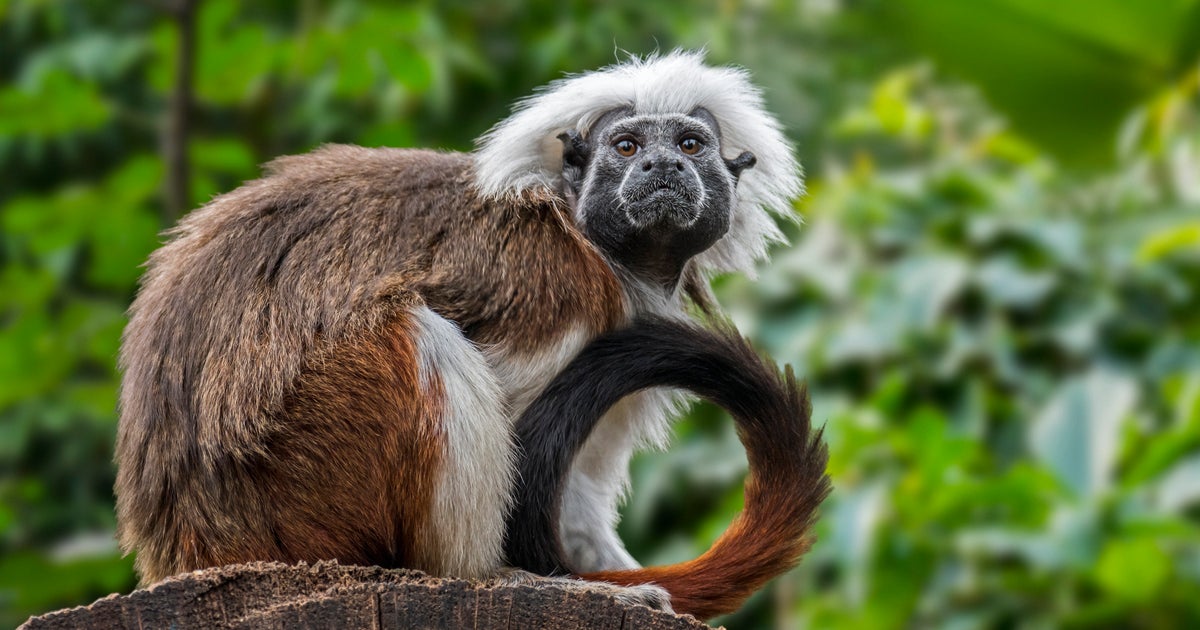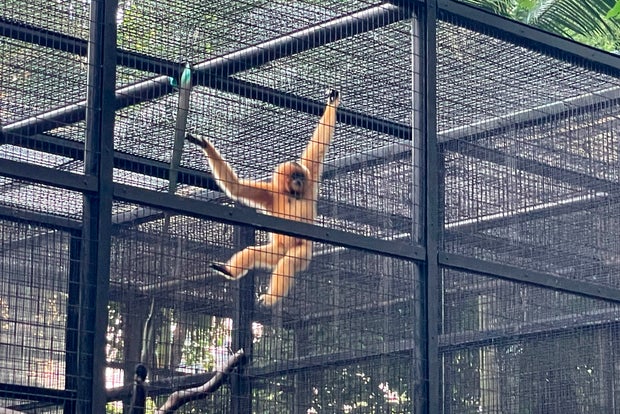CBS News
Hong Kong zoo officials reveal what killed 9 monkeys, including endangered Tamarins

Nine monkeys – including three from a critically endangered species – who died in Hong Kong’s oldest zoo this week had been infected with an endemic disease, officials said on Friday.
The animals in the Hong Kong Zoological and Botanical Gardens contracted melioidosis, possibly after some digging work near their cages, that later caused them to develop sepsis, Secretary for Culture, Sports and Tourism Kevin Yeung said in a press briefing.
Yeung stressed that such infections typically occur through contact with contaminated soil and water and that there is generally no danger to humans from contact with infected animals or people.
“We’re saddened by the passing of the nine monkeys,” he said.
Eight monkeys were found dead on Sunday and another died Monday after displaying unusual behavior, officials said earlier this week. The deceased animals were a De Brazza’s Monkey, one Common Squirrel Monkey, three Cotton-top Tamarins and four White-faced Sakis.
Philippe Clement/Arterra/Universal Images Group via Getty Images
Cotton-top Tamarins — a type of small, tree-dwelling monkey native to the tropical forests of South America — are considered one of the most endangered species of primates in the world.
Fewer than 6,000 of the monkeys are left in the wild, according to the Smithsonian’s National Zoo and Conservation Biology Institute.
What is melioidosis?
According to Hong Kong’s Center for Health Protection, melioidosis is caused by the bacterium Burkholderia pseudomallei, which is widespread in soils and muddy water.
Yeung said the park conducted digging work to repair some irrigation pipes under the flower bed near the monkey cages in early October and that the deaths might be related to that.
He said the monkeys might have come into contact with the bacteria after the park’s staff walked into their cages with possibly contaminated shoes. Another possibility is that some infected monkeys had close contact with other monkeys, he said.
“The incubation period for melioidosis in primates is about a week and this matched with the period after the soil digging work,” he said.
According to the Centers for Disease Control and Prevention, other animals known to get melioidosis include sheep, goats, pigs, hogs, boars, horses, cats, dogs and cows. The disease is mostly found in tropical climates, especially in Southern Asia and northern Australia.
AP Photo
Edwin Tsui, the controller of the center, said the incident only happened in a single zone and its impact on Hong Kong residents would be very low.
Yeung on Monday held an urgent interdepartmental meeting about the deaths with the Leisure and Cultural Services Department, the Agriculture, Fisheries and Conservation Department and the Department of Health.
Another De Brazza’s monkey also displayed unusual behavior and appetite but officials said its condition remained stable on Friday.
The Hong Kong Zoological and Botanical Gardens — the oldest park in the former British colony — fully opened to the public in 1871. It is a rare urban oasis in the downtown Central district of the financial hub, which returned to Chinese rule in 1997.
The deceased monkeys were among 93 mammals kept at the zoo, which also houses reptiles and birds.
CBS News
New details emerge about Wisconsin school shooting suspect

Watch CBS News
Be the first to know
Get browser notifications for breaking news, live events, and exclusive reporting.
CBS News
Supreme Court agrees to hear case about TikTok ban

Watch CBS News
Be the first to know
Get browser notifications for breaking news, live events, and exclusive reporting.
CBS News
Teen victim of AI-generated “deepfake pornography” urges Congress to pass “Take It Down Act”

Anna McAdams has always kept a close eye on her 15-year-old daughter Elliston Berry’s life online. So it was hard to come to terms with what happened 15 months ago on the Monday morning after Homecoming in Aledo, Texas.
A classmate took a picture from Elliston’s Instagram, ran it through an artificial intelligence program that appeared to remove her dress and then sent around the digitally altered image on Snapchat.
“She came into our bedroom crying, just going, ‘Mom, you won’t believe what just happened,'” McAdams said.
Last year, there were more than 21,000 deepfake pornographic videos online — up more than 460% over the year prior. The manipulated content is proliferating on the internet as websites make disturbing pitches — like one service that asks, “Have someone to undress?”
“I had PSAT testing and I had volleyball games,” Elliston said. “And the last thing I need to focus and worry about is fake nudes of mine going around the school. Those images were up and floating around Snapchat for nine months.”
In San Francisco, Chief Deputy City Attorney Yvonne Mere was starting to hear stories similar to Elliston’s — which hit home.
“It could have easily been my daughter,” Mere said.
The San Francisco City Attorney’s office is now suing the owners of 16 websites that create “deepfake nudes,” where artificial intelligence is used to turn non-explicit photos of adults and children into pornography.
“This case is not about tech. It’s not about AI. It’s sexual abuse,” Mere said.
These 16 sites had 200 million visits in just the first six months of the year, according to the lawsuit.
City Attorney David Chiu says the 16 sites in the lawsuit are just the start.
“We’re aware of at least 90 of these websites. So this is a large universe and it needs to be stopped,” Chiu said.
Republican Texas Sen. Ted Cruz is co-sponsoring another angle of attack with Democratic Minnesota Sen. Amy Klochubar. The Take It Down Act would require social media companies and websites to remove non-consensual, pornographic images created with AI.
“It puts a legal obligation on any tech platform — you must take it down and take it down immediately,” Cruz said.
The bill passed the Senate this month and is now attached to a larger government funding bill awaiting a House vote.
In a statement, a spokesperson for Snap told CBS News: “We care deeply about the safety and well-being of our community. Sharing nude images, including of minors, whether real or AI-generated, is a clear violation of our Community Guidelines. We have efficient mechanisms for reporting this kind of content, which is why we’re so disheartened to hear stories from families who felt that their concerns went unattended. We have a zero tolerance policy for such content and, as indicated in our latest transparency report, we act quickly to address it once reported.”
Elliston says she’s now focused on the present and is urging Congress to pass the bill.
“I can’t go back and redo what he did, but instead, I can prevent this from happening to other people,” Elliston said.










